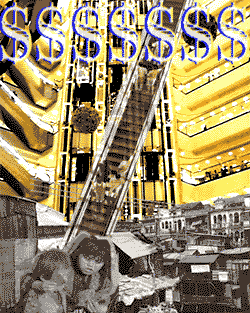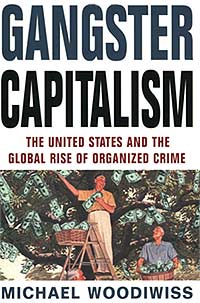|
from 11 dec 2005 blue vol IV, #29 |
|
Books Review Archive
Gangster Capitalism by Michael Woodiwiss Constable, London, 2005 & Carroll & Graf, US, 2005 Previous Arts Reviews |
Books Available From:


|
|
- Capitalism 
by William Bowles
 Review: Gangster Capitalism – The United States and the Global rise of Organized Crime, by Michael Woodiwiss
Review: Gangster Capitalism – The United States and the Global rise of Organized Crime, by Michael Woodiwiss
Well the jury is no longer out, there is no doubt about it - the history of Western 'civilisation' is an unmitigated disaster and one based upon a lie from beginning to what might well be its end in a short space of time. Perhaps the worst aspect of it all is the hypocrisy involved and don't get me wrong here, we've all been taken in by it, from buying into it starting from the 'Age of Enlightenment' onwards even as a minority of us benefit from the 'progress' it has bought us at a cost that is incalculable not only to humanity but ultimately to the planet itself. Documenting the disaster is not that difficult, the problem is getting people not only to take in the sheer scale of it but to get off our tired and sorry arses and do something about it. However, documenting it is something that has to be done if only to set the record straight. The statistics are horrendous; in the Américas alone, perhaps 80 million people exterminated between the 1600s and 1800s; in Africa, perhaps 40 million - 20 million-plus just in the Congo. 20 million exported into slavery of which it's calculated 10 million never made it to the 'New World'. In what is now South Africa, the indigenous Khoi San people were all but wiped off the face of the planet; I could go on but I think you get the point; wherever Western 'civilisation' has gone, it has first exterminated and then expropriated. And in the 20th century, the combined effects of wars, engineered famines that killed milions, and murderous economic policies add up to perhaps another 100-150 million and all of it in the name of Western 'civilisation'. So all-told we are talking of maybe a quarter of a billion people but the numbers make one's head spin and ultimately the total will never be known and in any case, the point is not the numbers but the fact that it has been so well hidden and worse, justified in one way or another. Very often, the apologists merely recount the events brushing them off as 'history', regrettable but worth it in the long run, we, after all, are better off for it, aren't we? But then the arrogance of the powerful and those who do their bidding is legend and in any case, it relies on an inculcated racist mindset that enables us to justify the exterminations, they were, after all, 'not like us'. But Holocausts are only 'news' when they justify the ravages of capital, else how is it that they can sell only one Holocaust in a relentless sales job that ignores the far greater and just as calculated exterminations that have taken place. The double standard is breathtaking in its audacity but it relies on the simple fact that those of us in the West are complicit in the crimes, we have after all, benefited from them - we still do, every day we go shopping or hop on a plane to some far-off (former) 'paradise' and get waited on by the recipients of 'progress'. For the better part of the 20th century the mass media has done an excellent job of selling the biggest lie of all, that we in the West live in democratic societies ruled by a political class that allegedly represents us and our interests, and the country where this lie has been sold to the greatest effect is undoubtedly the United States of America. Gangster Capitalism documents the lie in all its sordid details from the days of the 'Robber Barons' through to the 'War on Terror' and all the stops in-between, the 'War on Communism', the 'War on Drugs'. Between them, they are responsible for an assault of unparalleled brutality that is global in scope and a lie that has been so successfully sold, it has dragged much of the planet into going along with it. From the United Nations to so-called independent states, all have been bribed, blackmailed, threatened or finally invaded/occupied into participating in the various 'wars' the US is waging, ultimately to the benefit of capital. That all of it has been done in the name of 'morality', mostly of a Christian flavour, is perhaps what makes it all so sordid, so disgusting and hypocritical. There is a direct relationship between the extermination of 'inferior' peoples and the crimes of the Gangster Capitalists, from the owners of the plantations, to those who built the railroads that opened up the interior of America, to those who built the stockyards of Chicago, the auto plants of Detroit that consumed the immigrants in their millions and co-opted them into swallowing the 'American Dream'. Gangster Capitalism does one heck of a job in documenting the process, indeed it is relentless in its exposure and all the while revealing the underlying motivations; power and control by the few over the many. Underpinning the process has been the use of a twisted Christian 'morality' that in reality justified a system of exploitation that is unparalleled in history. And, Woodiwiss emphasises the role that race plays in the process, something that cannot be stated too strongly if we are to understand why US capitalism has been so successful at persuading so many to go along with the lie. "Property is King" I think it is entirely proper to describe US capitalism as organised crime on a gigantic scale largely, because as Woodiwiss makes clear, until Roosevelt's 'New Deal', business was almost completely unregulated and since the days of Nixon presidency, the US has returned to those heady days of the Robber Barons but one that now spans the globe. The emergence of the 'Robber Barons' at the turn of the century, mistakenly described as we have seen from the Enrons and Global Crossings scams, as a thing of the past, are in fact, only possible because they exist in a free-for-all society, where property rules. The Enrons are not merely a couple of 'rotten apples in the barrel' but illustrate a barrel that is rotten to the core. By the 1920s America had "become a land of criminal opportunity" due largely to a completely unregulated business environment made all the more possible through the creation of giant business corporations and where it was impossible "to draw a line between legitimate business practice and genuine rackets". The irony of a society which is based upon 'moral authoritarianism' is not lost on me, an hypocrisy which Prohibition threw into sharp relief. Worse still, Prohibition impacted mostly on the poor; the rich and connected not only carried on with business (and pleasure) as usual but were well placed to exploit the business opportunities that Prohibition opened up, after all, the wealth of the Kennedy clan was based upon illegal liquer. 'Organised crime' as it is called, whether the so-called Mafia or Colombian drug cartels are a drop in the capitalist bucket, even the figures upon which the mass media bases its headlines, are fictitious, based upon nothing more than grossly inflated figures for which there is no statistical basis. From the womb to beyond the grave Chapter 1 deals with fraudulent fertility clinics, medicare scams, morticians that dump bodies, trade in body parts, medical insurance scams involving literally hundreds of millions of dollars, price fixing by the pharmaceutical companies, the list goes on and, as the author points out, "Adult, working Americans are far more likely to die young as a result of organised, corporate crime than from any other form of criminal activity." (p.30) And so too with the food industry "Every day ... roughly 200,000 people sickened by food-borne disease, 900 are hospitalized, and fourteen die... [M]ore than a quarter of the American population suffers a bout of food poisoning every year." (p.34) And once more the cause is the almost total lack of government regulation. Forget OSHA and government oversight not only of the food itself but also the working conditions. The meat processing industry is the most dangerous occupation in the US. The stark reality is revealed by the fact that "None of the cases [mentioned] involves a member of the Mafia or any of the other supercriminal organisations that constitute organised crime according government sources." (p.39) The book explodes the myth of organised crime as being a major threat to society and illustrates the reality that the real threat to society comes from the government's own policies and the economic class it represents. And although the book doesn't mention the 'war on terror' at all, the policies enacted and forced on the rest of the world, especially the 'war on drugs' that Nixon introduced, served as the ideal model for the 'war on terror', based as they both are, on a mythical globe-spanning network of 'supercriminals' dedicated to the destruction of Western 'civilisation' whether by accident or design as in the case of 'al-Qu'eda'. As ever, the mythology of organised crime has been peddled very effectively by the mass media, playing on the fears of the 'alien' in our midst from the 'Sicilian Mafia' through to the Colombian drug cartels, both of which have attained the power they do possess directly as a result of US government policies. Woodiwiss also points out the fact that anti-Communism has been central to the creation of the alien 'conspiracy' and once again it was US government policies in fighting Communism in Afghanistan which saw the rise of the heroin trade, supplanting the traditional source, Turkey. Massive interdiction, for example Operation Intercept, designed in theory to stop the supply of drugs from Mexico, resulted in the searching of 2 million people but was terminated after only three weeks. The sheer futility of such exercises was made plain after the Turkish government, for a payment of $35 million, banned poppy production "...when an economist calculated that the US demand for heroin could be met by the amount of opium poppies growing on a 10- to 20-square-mile patch of land, roughly equivalent to the island of Manhattan." (p.138) The scale of the government's 'war on drugs' is amply illustrated with the following figures "In 1969, $65 million was spent by the Nixon administration on the drug war... In 1982 the Reagan administration increased this commitment to $1.65 billion. In 2000 the Clinton administration massively increased this figure to $17.9 billion. In 2002 the Bush administration spent more than $18.822 billion." (p.108) Predictably, these policies have resulted in a vast increase in the prison population, mostly for simple possession, "In 1973, there were 328,670 arrests for drug law violations ... In 1989, there were 1,361,700 drug arrests, nearly 10 per cent of all arrests. In 2002, [the] number rose to 1,538,813. Forty-five per cent of the 2002 arrests were for marijuana rather than for more dangerous drugs ... Between 1980 and 1994, the prison population tripled from 500,000 to 1.5 million. In 2002 the United State incarcerated 2,166,260 persons." (p.108) and: "It has long been known that prisons were self-perpetuating institutions because they reinforced existing criminal attitudes and because they provided many opportunities for learning new criminal techniques." (p.139) The War on Organised Labour "Roosevelt's New Deal saw the state intervening into the affairs of business unprecedented during peacetime in an effort to curb the virtual anarchy that prevailed, an anarchy which played no small part in the Crash of '29. Organised labour in turn made overtures to the Democratic Party which were rejected and as Woodiwiss points out, this led to the Democratic Party 'incapable of defending the key achievements of the New Deal'." (p.68) Following a wave of massive strikes during 1945-46, a campaign aided in no small part by the fear and paranoia instigated by the rising anti-communism of the 1940s and 1950s. Big capital was determined to reverse at all costs the gains made during the period of the New Deal and to "reeducate the public in the principles and benefits of the American economic system. These campaigns successfully projected a vision of America as the perfect society. Perfect because it was 'harmonious, classless, free, productive and, therefore, affluent and successful." (p.69) Selling the capitalist system What should not be let out sight in cataloguing the crimes of capitalism is the plain fact that underpinning and rationalising the 'morality' of the capitalist way of life is an economic system that is in a permanent state of crisis, lurching from boom to bust and with every crisis the stark reality that to maintain the rate of profit it must, perforce, extract ever more from our labours. To justify this process, it must on the one hand, seek to justify and cover up the robbery and on the other, create the right conditions for an ever-increasing rate of profit, whether by 'fair' means or foul. What the history of the United States reveals is that capitalism, when left to its own devices is a system run by a gangster class whose actions as Woodiwiss so clearly demonstrates, makes the affairs of the 'Mafia' pathetic and amateur copies of those whose 'morality' they essentially seek to emulate. Gangster Capitalism is a devastating exposé of the blanket propaganda we have been subjected to for generations; propaganda that seeks to present the capitalist system as just, moral and the 'best of all possible worlds', when the reality is diametrically the opposite.
|
| BLUE is looking for short fiction, extracts of novels, poetry, lyrics, polemics, opinions, eyewitness accounts, reportage, features, information and arts in any form relating to eco cultural- social- spiritual issues, events and activites (creative and political). Send to Newsdesk. |

 In the seventies I worked in electronic publishing (SouthScan), radio production (WBAI FM), television (South Africa Now) and ultimately on to Africa. During this period I [became] involve[d] with the African National Congress and later SWAPO in Namibia and work in Central America, again using computers as tools of communication and change.
In the seventies I worked in electronic publishing (SouthScan), radio production (WBAI FM), television (South Africa Now) and ultimately on to Africa. During this period I [became] involve[d] with the African National Congress and later SWAPO in Namibia and work in Central America, again using computers as tools of communication and change.